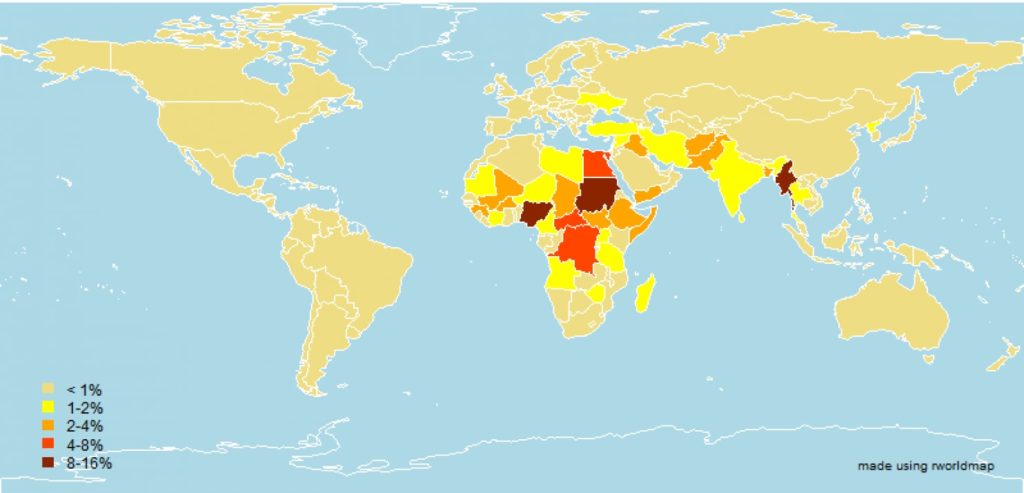Map: The Risk of Genocide around the World
SPECIAL FEATURE, 24 Sep 2018
Ishaan Tharoor – The Washington Post
21 Sep 2015 – Communities living in the countries in darker colors in the map are at greater risk of state-led mass violence, according to a think tank connected to the U.S. Holocaust Memorial Museum.

The world’s countries, as reflected by the risk of mass atrocities in each. (Simon-Skjodt Center for the Prevention of Genocide United States Holocaust Memorial Museum). WP
The Simon-Skjodt Center for the Prevention of Genocide launched a tool aimed at forecasting the risk of state-led mass killings. The Early Warning Project tracks the apparent signs of a potential pogrom or assault on minorities within a state. Its findings stitch annual statistical risk assessments of individual countries — based on a number of models conceived by political scientists — alongside crowd-sourced opinion surveys of regional experts.
The 10 countries at the highest risk of experiencing a future episode of mass killing are as follows:
- Myanmar
- Nigeria
- Sudan
- Central African Republic
- Egypt
- Democratic Republic of Congo
- Somalia
- Pakistan
- South Sudan
- Afghanistan
Earlier this year, WorldViews talked to Cameron Hudson, director of the Simon-Skjodt Center, about the threat in Burma (also known as Myanmar). Hudson had been part of a fact-finding mission to the country, studying the risks faced by the beleaguered Rohingyas, a Muslim minority that’s been rendered stateless by decades of discriminatory Burmese policies.
A report concluded then that the Rohingya were a people “at grave risk for additional mass atrocities and even genocide.”
“We’re very cautious when we invoke the term ‘genocide,’ knowing that it can be quite polarizing and sometimes even unhelpful,” said Hudson at the time. “But there is a combination of factors — many of which you saw in 1930s Germany and 1990s Rwanda — that are quite concerning.”
The project now is anchored in the Holocaust Museum’s moral mission to educate against and prevent future atrocities, says Michael Chertoff, former secretary of Homeland Security and chairman of the museum’s Committee on Conscience, in an e-mailed news release.
“No longer can governments say that they ‘did not know’ as a means of justifying their inaction,” he said.
_______________________________
Ishaan Tharoor writes about foreign affairs for The Washington Post. He previously was a senior editor at TIME, based first in Hong Kong and later in New York.
Go to Original – washingtonpost.com
DISCLAIMER: The statements, views and opinions expressed in pieces republished here are solely those of the authors and do not necessarily represent those of TMS. In accordance with title 17 U.S.C. section 107, this material is distributed without profit to those who have expressed a prior interest in receiving the included information for research and educational purposes. TMS has no affiliation whatsoever with the originator of this article nor is TMS endorsed or sponsored by the originator. “GO TO ORIGINAL” links are provided as a convenience to our readers and allow for verification of authenticity. However, as originating pages are often updated by their originating host sites, the versions posted may not match the versions our readers view when clicking the “GO TO ORIGINAL” links. This site contains copyrighted material the use of which has not always been specifically authorized by the copyright owner. We are making such material available in our efforts to advance understanding of environmental, political, human rights, economic, democracy, scientific, and social justice issues, etc. We believe this constitutes a ‘fair use’ of any such copyrighted material as provided for in section 107 of the US Copyright Law. In accordance with Title 17 U.S.C. Section 107, the material on this site is distributed without profit to those who have expressed a prior interest in receiving the included information for research and educational purposes. For more information go to: http://www.law.cornell.edu/uscode/17/107.shtml. If you wish to use copyrighted material from this site for purposes of your own that go beyond ‘fair use’, you must obtain permission from the copyright owner.